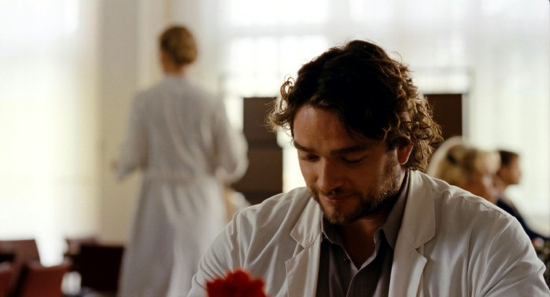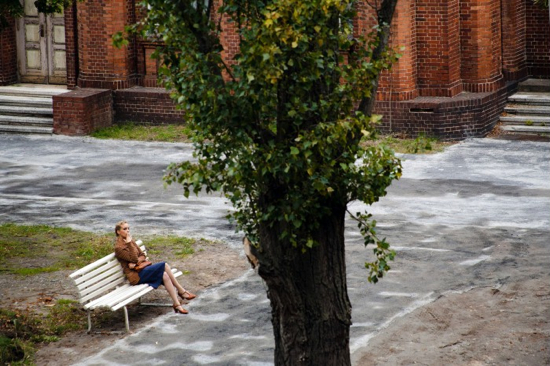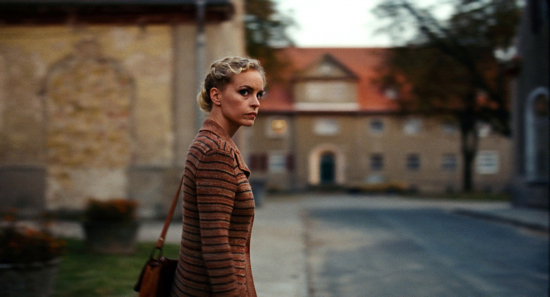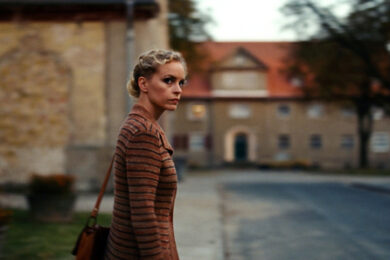Christian Petzold’s sixth theatrical feature is set in 1980 and loosely based on Hermann Broch’s novella Barbara. In her fourth collaboration with the award-winning director, Nina Hoss plays the title role: a doctor from Berlin’s respected Charité clinic who, after applying for an exit visa, is sent as a punishment by the government to an isolated provincial town in northern East Germany, to work at the local hospital. Preparing to flee via the Baltic Sea, she starts a relationship with her colleague André (an engaging performance from relative newcomer Ronald Zehrfeld), a man she initially mistrusts.
Anyone anticipating a rerun of The Lives Of Others (2006), which used a DDR setting as the basis for a popular political thriller, should modify their expectations. This is another type of cinema altogether. Petzold is part of the alternative ‘Berlin School’ or ‘Nouvelle Vague Allemande’. He has also previously been dismissive of making commercially minded historical movies.
As such, the focus is less on historical context and more on the personal journey of Barbara in her narrow world (suburban Germany being a constant theme in the director’s previous work, notably 2008’s Jerichow). The political cannot be separated from the personal. The locations are also very minimal, creating this sense of living in a small, sealed off world. The action mainly takes place in the hospital, along the same stretches of anonymous country road, and in Barbara’s apartment.
Influenced by Antonioni’s slow cinema and Roberto Rossellini’s neorealist drama Stromboli (1950), Petzold uses lots of long takes where not much happens. Combined with the noticeable absence of a musical score, it means that the audience is left to interpret things for themselves. This ambiguity is implicit in the lead character. When we are introduced to Barbara we receive virtually no biographical information and little detail about her circumstances. So the viewer has no idea what her life in Berlin was like, making it harder to judge how much worse off she is in her new situation.
At first we see her as pensive, taciturn and aloof. She doesn’t fraternise with the other doctors – who call her a typical Berliner – and treats André loftily, refusing his offer of a ride. We also do not know the precise details of her relationship with the likes of Stella (Jasna Fritzi Bauer), a distressed young patient who evidently keeps trying to escape East Germany and ends up at Barbara’s place. Or indeed with her lover from West Berlin, of whom we are only given glimpses.

This all reflects a world in which it is extremely difficult to trust or know much about anyone. The audience is made a part of that world. We are just as suspicious as Barbara, whether catching another woman’s glance on the bus, or meeting André (who has been ‘groomed’ on her circumstances), or listening to cars pass by the window. Barbara keeps people at a distance and seems enigmatic, but at the same time Nina Hoss does a marvellously nuanced job of portraying such a restrained individual, conveying much using just her eyes or tightened jaw. We want to get to know this protagonist better. When we see her treating Stella with familiarity – reading to the girl as if she was her own daughter – we are allowed access to a more vulnerable, caring side.
This vulnerability is explicitly shown when she quietly pleads to Rainer Bock’s Stasi officer not to have to undergo another cavity search by one of his diffident female cohorts, or when she sits down exhausted at the end of a day at the hospital. Petzold also suggests that emotional restraint is necessary to survive here, by depicting a patient who has become cold and distant after attempting suicide (though it is arguable whether he is suicidal because of living in East Germany, or because he thinks his girlfriend cheated on him, or both – the director offers no easy answers).

In Barbara’s slowly growing relationship with André, with its small exchanges and intimate looks that say more than words can, something real and warm emerges. It is a bond that is forged both despite the restrictive conditions and also because of them. André makes his sympathy and feelings clear indirectly, in one scene pointing to a Rembrandt painting and emphasising that the painter wants you to feel for the victim depicted. This is more real to us than Barbara’s other relationship – which nominally promises ‘freedom’ – as her lover assumes that she’ll be fine to stop working upon escape. In contrast, André recognises how good a doctor she is and thus would never make that assumption.
Barbara takes a little while to engage and might be too slow for some, but offers an understated, morally complex view of East Germany that’s also effective and free of clichés in its rendering of happiness against the odds. Like the character herself, though the film at first appears distant and cold, it ends up being genuinely moving and even better on reflection.



